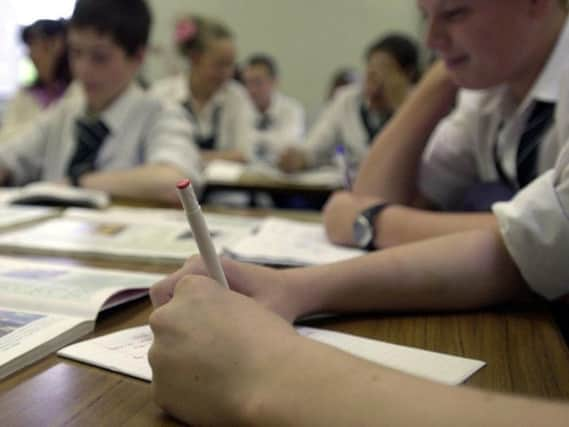Thousands of poorer pupils miss out on traditional exam subjects


Research published today has identified 15,000 disadvantaged pupils who it says should have been expected to take either history or geography but did not and another 11,000 who did not take a modern foreign language.
However the same study has also warned that the Government’s goal of getting 90 per cent of pupils to take on a raft of more academic subjects was too high and needs reconsidering.
Advertisement
Hide AdAdvertisement
Hide AdIt found that many schools have changed their curriculum in response to a change in Government policy to allow more students to take on core subjects.
The coalition Government created the English Baccalaureate (EBacc) to encourage schools to ensure students take on more traditional subjects.
An EBacc performance measure was introduced in league tables recognising schools where pupils achieved good GCSE passes in at least six subjects comprising English, maths, two sciences, a modern language and either history or geography.
The Government is also bringing in another new performance measure which scores schools for pupils’ progress and their results across eight subjects. Previously schools have been judged on how many pupils achieve at least five A* to C grades at GCSE, including English and maths.
Advertisement
Hide AdAdvertisement
Hide AdHowever league tables are being changed amid concern that the current system encourages schools to focus more on those pupils on the C/D borderline.
Now a new report, by Dr Rebecca Allen and Dave Thomson of Education Datalab, looks at how the introduction of the EBacc and ‘Progress 8 and Attainment 8’ have affected school’s choices.
The researchers identified 300 schools that implemented major curriculum change in response to the EBacc achieving a rise in the proportion of pupils entering the EBacc from eight per cent in 2010 to 48 per cent in 2013. They compared this group with similar schools that had not changed their curriculum as quickly.
They found that it was disadvantaged pupils who benefited most from the curriculum change with poorer students at these schools more likely to have taken EBacc subjects than at those schools who did not change their curriculum. Dr Becky Allen, director of Education Datalab and the report’s lead author, added: “In schools that have led the way in re-orientating their curriculum towards EBacc subjects, students seem to have benefitted.
Advertisement
Hide AdAdvertisement
Hide Ad“They are now more likely to achieve a good GCSE in maths and English and less likely to drop out at age 16, refuting claims that the more academic curriculum would distract focus from these core subjects.
“The challenge now is to consider what sort of Key Stage 4 curriculum is appropriate for students who are not entering the EBacc.” The previous government had set the target of 90 per cent of pupils taking the subjects necessary to achieve the EBacc.
However the report says a survey of headteachers found most thought this was beyond the reach of many schools given specialist teacher shortages.
And headteachers also believe EBacc subjects are not appropriate for all students.
Advertisement
Hide AdAdvertisement
Hide AdThe Sutton Trust is calling on the Government to consider curriculum changes for 16-year-olds who are not entering EBacc subjects and to do more to recognise technical qualifications and to reconsider its goal of having 90 per cent of all pupils sitting EBacc subjects.